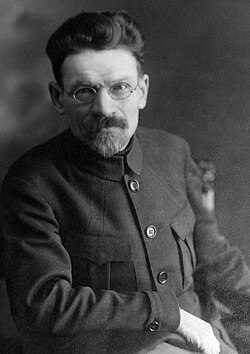
Back ميخائيل كالينين Arabic مايكل كالينين ARZ Mijaíl Kalinin AST Mixail Kalinin Azerbaijani Калинин Михаил Иванович Bashkir Міхаіл Іванавіч Калінін Byelorussian Міхаіл Калінін BE-X-OLD Михаил Калинин Bulgarian Mikhaïl Kalinin Catalan Michail Kalinin Czech
Mikhail Kalinin | |||||||||||||||||
|---|---|---|---|---|---|---|---|---|---|---|---|---|---|---|---|---|---|
Михаил Калинин | |||||||||||||||||
 Kalinin in 1920 | |||||||||||||||||
| 1st Chairman of the Presidium of the Supreme Soviet of the Soviet Union | |||||||||||||||||
| In office 17 January 1938 – 20 March 1946 | |||||||||||||||||
| Leader | Joseph Stalin | ||||||||||||||||
| Premier |
| ||||||||||||||||
| Deputy | Nikolai Shvernik | ||||||||||||||||
| Preceded by | Office established; Himself (as Chairman of the Central Executive Committee) | ||||||||||||||||
| Succeeded by | Nikolai Shvernik | ||||||||||||||||
| Chairman of the Central Executive Committee of the Soviet Union | |||||||||||||||||
| In office 30 December 1922 – 17 January 1938 | |||||||||||||||||
| Premier |
| ||||||||||||||||
| Preceded by | Office established | ||||||||||||||||
| Succeeded by | Office abolished; Himself (as Chairman of the Supreme Soviet) | ||||||||||||||||
| 3rd Chairman of the Central Executive Committee of the All-Russian Congress of Soviets | |||||||||||||||||
| In office 30 March 1919 – 15 July 1938 | |||||||||||||||||
| Preceded by | Yakov Sverdlov Mikhail Vladimirsky (acting) | ||||||||||||||||
| Succeeded by | Office abolished; Aleksei Badayev (as Chairman of the Presidium of the Supreme Soviet of the Russian SFSR) | ||||||||||||||||
| |||||||||||||||||
| Personal details | |||||||||||||||||
| Born | 19 November 1875 Verkhnyaya Troitsa, Russia | ||||||||||||||||
| Died | 3 June 1946 (aged 70) Moscow, Soviet Union | ||||||||||||||||
| Resting place | Kremlin Wall Necropolis, Moscow | ||||||||||||||||
| Political party |
| ||||||||||||||||
| Spouse | Ekaterina Ivanovna Lorberg-Kalinina | ||||||||||||||||
| Occupation | Civil servant | ||||||||||||||||
| Signature | |||||||||||||||||
Mikhail Ivanovich Kalinin (Russian: Михаил Иванович Калинин, IPA: [kɐˈlʲinʲɪn] ⓘ; 19 November [O.S. 7 November] 1875 – 3 June 1946)[1][2][3] was a Soviet politician and Russian Old Bolshevik revolutionary who served as the first chairman of the Presidium of the Supreme Soviet (head of state) from 1938 until his resignation in 1946. From 1926 until his death, he was a member of the Politburo of the Communist Party of the Soviet Union.
Born to a peasant family, Kalinin worked as a metal worker in Saint Petersburg and took part in the 1905 Russian Revolution as an early member of the Bolsheviks. During and after the October Revolution, he served as mayor of Petrograd (St. Petersburg). After the revolution, Kalinin became the head of the new Soviet state, as well as a member of the Central Committee of the Communist Party and the Politburo.
Kalinin remained the titular head of state of the Soviet Union after the rise of Joseph Stalin, with whom he enjoyed a privileged relationship, but held little real power or influence. He retired in 1946 and died in the same year. The former East Prussian city of Königsberg, annexed by the Soviet Union in 1945, was renamed Kaliningrad after him a year later. The city of Tver was also known as Kalinin until 1990, when its historic name was restored, one year before the eventual fall of the Soviet Union.
- ^ Agentstvo pechati "Novosti" (1975). Socialism: Theory and Practice. Novosti Press Agency. p. 73. Retrieved 19 November 2018.
- ^ Calendar: Thirty Years of the Soviet State, 1917–1947. Foreign Languages Publishing House. 1947. Retrieved 19 November 2018.
- ^ Abdurakhman Avtorkhanov, Stalin and the Soviet Communist Party: A Study in the Technology of Power. New York: Frederick A. Praeger, 1959; p. 1.
© MMXXIII Rich X Search. We shall prevail. All rights reserved. Rich X Search